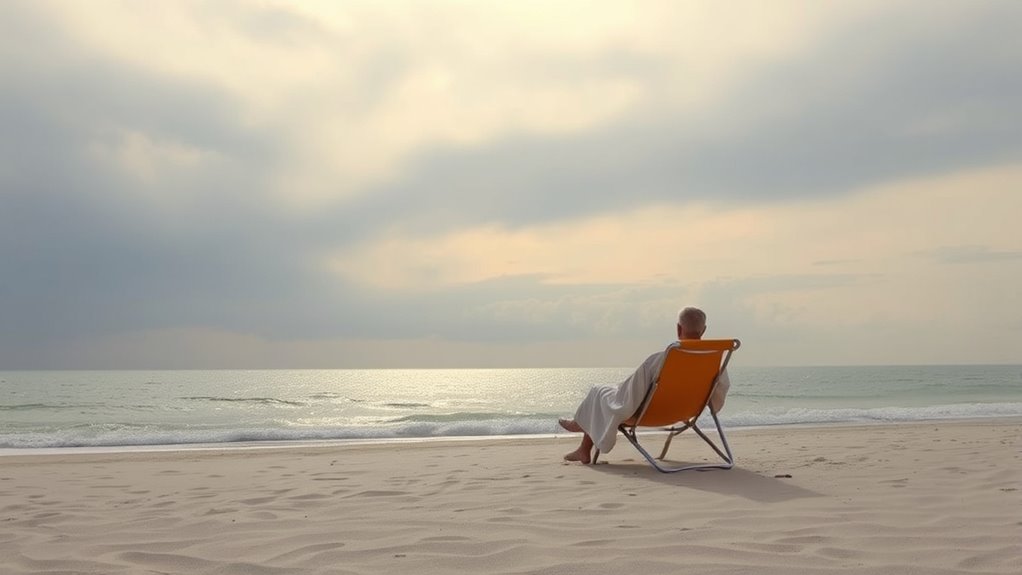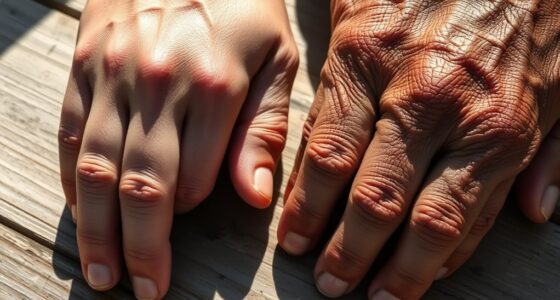Many believe that cloudy days protect you from sun damage, but that’s a myth. UV rays, both UVA and UVB, can penetrate clouds and reach your skin, increasing your risk of burns and long-term damage. Even when it’s overcast, your skin is still vulnerable, especially if you spend extended time outside. To stay safe, you need proper sun protection, regardless of the weather. Keep going to learn why protecting your skin is essential every day.
Key Takeaways
- UV rays can penetrate clouds, reaching your skin even on overcast days.
- Both UVA and UVB rays pass through clouds, increasing tanning and skin damage risks.
- Cloud cover does not eliminate UV exposure; prolonged outdoor time still causes harm.
- Many mistakenly believe cloudy days are safe, leading to insufficient sun protection.
- Wearing sunscreen and protective clothing is essential regardless of weather conditions.

Many people believe that cloudy days offer a safe escape from sun damage, but in reality, UV rays can penetrate clouds and still harm your skin. This misconception can lead you to underestimate the importance of UV exposure on overcast days. Even when the sun isn’t shining brightly, UV radiation can reach your skin, increasing the risk of burns, premature aging, and skin cancers. Cloud cover doesn’t block all ultraviolet rays; it simply reduces the intensity, which can trick you into thinking you’re safe. However, UV rays are still present and can cause damage, especially if you spend extended periods outdoors without proper skin protection. Understanding UV radiation exposure is essential to protecting your skin effectively. UV rays are divided into UVA and UVB types, both of which can penetrate clouds. UVA rays penetrate deeply into the skin, contributing to premature aging and skin damage, while UVB rays are primarily responsible for sunburns. Despite the cloudy weather, both types of UV rays can reach your skin, making it indispensable to take precautions no matter the forecast. If you’re planning outdoor activities on a cloudy day, don’t assume you’re invulnerable. Instead, treat every day as a potential risk for UV exposure. Skin protection becomes even more critical on overcast days. Applying a broad-spectrum sunscreen with at least SPF 30 is a simple yet effective step. Make sure to cover all exposed skin thoroughly, including commonly missed spots like ears, the back of your neck, and your hands. Reapply sunscreen every two hours, or more frequently if you’re sweating or swimming. Wearing protective clothing, such as long sleeves, wide-brimmed hats, and UV-blocking sunglasses, also adds an extra layer of defense. Seek shade during peak sunlight hours, typically between 10 a.m. and 4 p.m., when UV rays are most intense. Remember, UV rays reflect off surfaces like water, sand, and concrete, so you can still be exposed even when you’re not directly under the sun. Being vigilant about skin protection on cloudy days is essential to maintaining healthy skin and reducing your risk of long-term damage. Don’t wait for clear skies to start protecting yourself; UV exposure is a constant threat, regardless of the weather. By incorporating effective skin protection strategies into your routine, you guarantee that you’re guarding your skin from harmful rays every day. This awareness helps you enjoy outdoor activities without compromising your skin’s health, proving that cloudy days aren’t an excuse to skip sun safety measures.
Frequently Asked Questions
Can UV Rays Penetrate Clouds on Overcast Days?
Yes, UV rays can penetrate clouds on overcast days due to UV ray penetration, meaning you’re still exposed to harmful rays even when it’s cloudy. Cloud cover effects don’t block all UV radiation; up to 80% can pass through. So, you should still wear sunscreen, seek shade, and protect your skin, because overcast skies don’t eliminate the risks of UV exposure and skin damage.
How Does Cloud Cover Affect UV Exposure Risk?
Cloud cover can actually increase your UV exposure risk due to cloud reflection, which bounces UV rays back toward you. While clouds diffuse some UV intensity, they don’t block it completely, so you still get significant UV exposure on overcast days. This means you should wear sunscreen and protective clothing even when the sky looks cloudy, as UV rays can penetrate through clouds and reflect off surfaces, increasing your overall exposure.
Is Tanning on Cloudy Days More Dangerous Than Sunny Days?
Tanning on cloudy days can be just as dangerous as on sunny days because cloud reflection and UV penetration still expose you to harmful rays. Clouds don’t block UV rays completely; they scatter and allow some UV to reach your skin. So, even if the sky looks overcast, you can still get sun damage. Always wear sunscreen and protective clothing, regardless of the weather, to protect your skin effectively.
Do UV Filters in Skincare Protect Against Cloud UV Rays?
A stitch in time saves nine—so, yes, UV filters in skincare can help protect you against UV rays on cloudy days. They improve UV filter effectiveness, reducing skin damage prevention risks, but aren’t foolproof. Clouds don’t block all UV rays, so you should still wear sunscreen, seek shade, and wear protective clothing. Relying solely on UV filters leaves your skin vulnerable; combine methods for the best defense.
How Can I Tell if I’M Getting Enough or Too Much UV Exposure on Cloudy Days?
You can tell if you’re getting enough or too much UV exposure on cloudy days by paying attention to UV intensity and your skin response. If your skin starts to feel warm, turn pink, or shows signs of redness, you’re likely getting too much UV. Using a UV index app helps gauge UV levels, and if your skin feels no different after sunlight exposure, you might need more time outside.
Conclusion
Don’t deceive yourself into thinking cloudy days are safe for tanning. Clouds can cloak harmful UV rays, silently slipping through to damage your skin. So, stay smart and shield yourself, regardless of the sky’s shroud. Remember, protecting your skin isn’t just a choice—it’s a vital commitment. Be vigilant, embrace vacations without regrets, and keep your skin safe, sunny, and stunning, no matter the weather.









